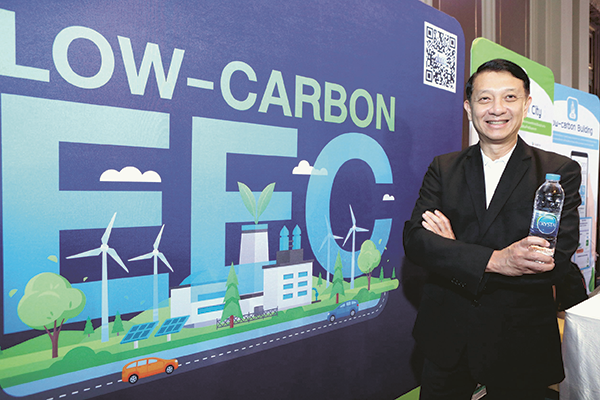| SUSTAINABILITY |


ThaiBev has identified climate change risks and integrated these into its overall risk management processes. These risks are then ranked and monitored by the Sustainability and Risk Management Committee, which is comprised of directors, senior management, and independent directors. The committee is tasked with ensuring sound risk and sustainability policy by monitoring possible impacts from climate change on the company’s operations, and planning and taking actions to mitigate these risks.

ThaiBev has prioritized raising awareness about
climate change in the organization. A climate strategy
workshop with all business units was conducted to
identify both the transition and physical risks, as well
as the opportunities presented by climate change.
Executives from all business units attended the
workshop to brainstorm risks and opportunities.
Examples of physical risks include increasing water
and other natural resource scarcity.
Transitional risks
are production limitations, cap and trade schemes,
and fuel or carbon taxes. Each business unit then
ranked these risks as per ThaiBev’s corporate risk
management process. Lastly, opportunities were
identified to ensure required changes could be
planned for at the earliest date; opportunities
included low carbon products, resource efficiency,
alternative raw materials and energy, and engaging
and collaborating with suppliers. ThaiBev has already
implemented schemes such as water sustainability
assessment studies at two locations: Pathum Thani
and Ayutthaya provinces.
These evaluations of the
current water sustainability situation and associated
risks in these two provinces are illustrations of how
ThaiBev is taking the risks and opportunities presented
by climate change seriously. A further five locations
are planned to undergo studies in 2020.
ThaiBev conducted a desktop physical risk assessment of natural hazards up to 2030 at all production sites in Thailand and overseas to better understand the physical risks and prepare for the impacts of climate change under numerous scenarios. The following natural hazards were studied: earthquakes, cyclones, wild fires, water stress, floods, landslides, extreme winds, sea level rise, and storm surge. From these identified issues, individual production sites are developing appropriate risk management and mitigation plans.









ThaiBev used the Quick Environment Savings Technique (QUEST)
and Marginal Abatement Cost Curve (MACC) methodologies to
model new projects with associated emission reductions against
numerous climate targets. ThaiBev is able to use these tools to
model transitional risks such as production limitations or carbon tax.
This project was started at one spirit factory, Red Bull Distillery
Samut Sakhon and then rolled out to all other business units by
analyzing their production plans and emission reduction projects. As
a result, company-wide, ThaiBev is able to be fully prepared for the
emission reductions required in order to meet the newest targets.


| Direct GHG emission (Scope1) | |
| Indirect GHG emission (Scope2) |

| Direct GHG emission (Scope1) | |
| Indirect GHG emission (Scope2) |


| ThaiBev has set climate change targets
in line with Thailand’s Paris Agreement commitment to reduce the greenhouse gas intensity by 14%
in all beverage
businesses by 2025with 2018 as the base year |